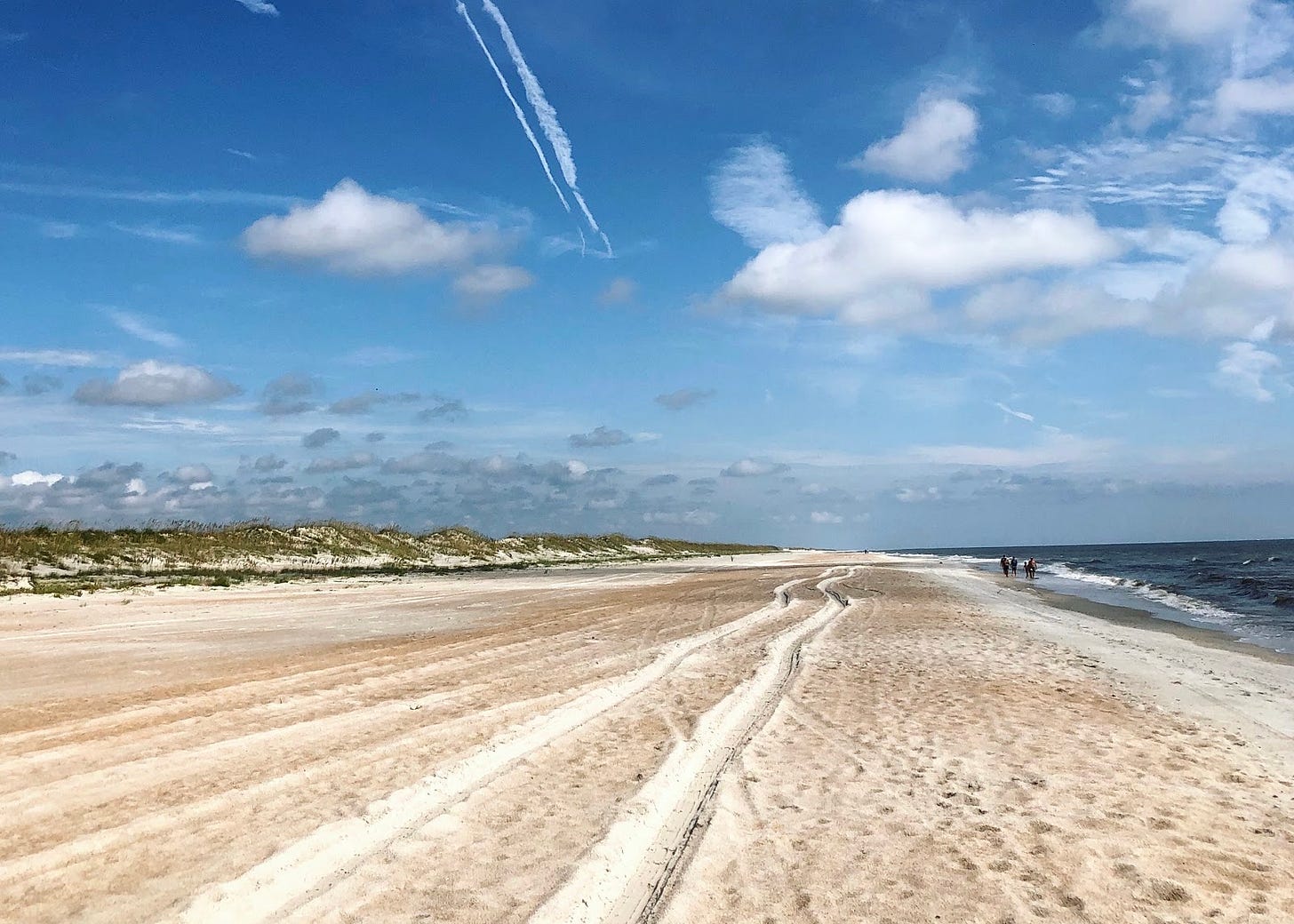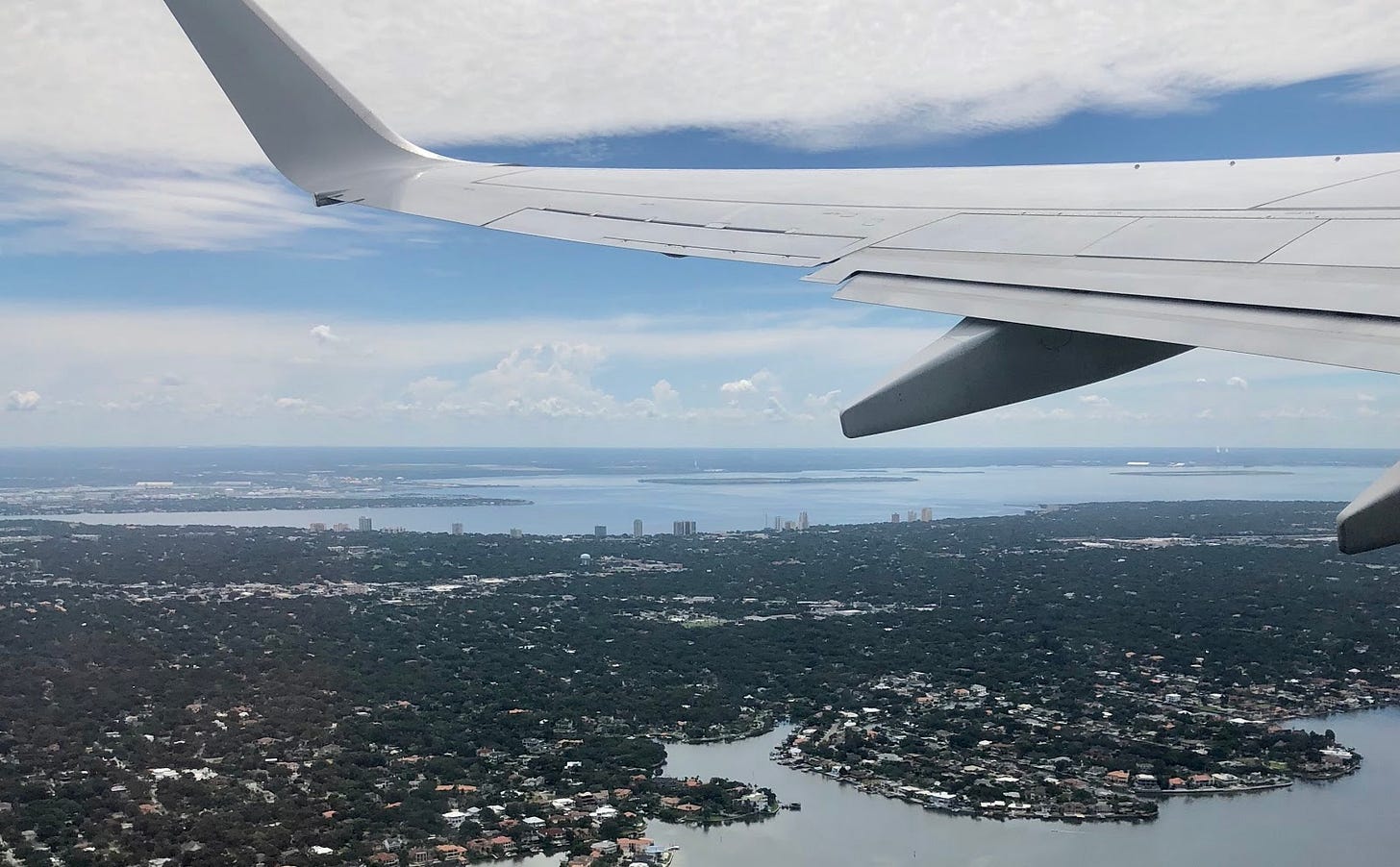The upside of slowing down
There’s less to plan for, but plenty to appreciate.
A few weeks ago, a friend of mine received a big promotion at work. I was thrilled about the news—not only because it was well-deserved and long overdue, but because it meant we had a reason to get together.
“In normal times, I would insist on taking you out for a beer to celebrate,” I texted him. Instead, I suggested a socially-distant double date on our porch, complete with takeout for dinner, strawberry spoon cake for dessert, beer for everyone else, and a mocktail for me.
I texted my friend on a Monday, and we met that Friday. The evening was lovely, but what was arguably even better was having plans in the first place. That dinner was the light at the end of the tunnel of yet another week spent at home.
Research has proven that anticipating positive things can help us live happier lives. Looking forward to holidays, vacations, or even dinners out can benefit our well-being. In fact, there’s proof that people are happier in anticipation of a big event than in remembering the experience itself.
But what happens when all those big events get cancelled at once?
Earlier this year, I wrote about the joys of making plans. That post, which now haunts me a bit, was published on March 3, just before coronavirus started its rapid spread across the United States. Soon after I sent out that newsletter, lockdowns went into effect across the country. Like everyone else, nearly all of my long-term plans fell through.
At the beginning of quarantine, there was a novelty to staying at home and socializing virtually. I enjoyed brunch with friends over Google Hangout, attended a baby shower via Zoom, and played video games with old college roommates through Jackbox. I celebrated birthday parties, shared pregnancy updates, and participated in elaborate game nights with family from afar.
Lately, it’s been tougher to muster up the energy and enthusiasm for virtual reunions. The novelty has worn off and Zoom fatigue has set in. No matter how well-intentioned or creative, it’s become obvious that virtual gatherings can’t replace real-life interaction. It’s no surprise that my calendar—once full with various video hangouts—is a lot emptier these days.
In the absence of these gatherings, my partner Billy and I have tried to make future plans in fits and starts. We’ve had conversations about the end of 2020, discussing how we’ll navigate the holidays and visits with family after the baby is born. Inevitably, we always reach the same unsatisfying conclusion: There are too many unknowns to plan that far ahead yet. Instead of capturing that feel-good anticipatory boost that comes with making plans, we both wind up feeling frustrated and a bit discouraged.
Those feelings are exacerbated by the fact that seemingly half the country is operating as if coronavirus is no longer a concern, despite the number of positive cases continuing to climb. It appears like there are plenty of mask-less people out and about, enjoying dinners at restaurants, parties with friends, and vacations with family. They have things to look forward to. Meanwhile, Billy and I—like so many concerned and immunocompromised people—are still at home, wondering when the world will feel safe enough to interact with again.
Last year, I spent 80 days away from home—almost one full week a month. In 2018, I spent more than a third of the year—119 days—on the road. Those days were filled with work presentations and conferences, quick trips to see friends and family, and countless hours at airports. On the days that I wasn’t traveling, there was a good chance that Billy, a musician, would be touring. And in the rare moments that we were both home, we’d often play host to friends and family. My schedule was so crowded that I barely had time to enjoy the anticipation of what was next. I bounced from task to task, exhausted, with little time to savor the moment.
In comparison, I’ve traveled for 19 days this year, all within the first three months of 2020. Now, my once-packed calendar yawns open, with nothing ahead to fill it.
Surprisingly, it doesn’t feel that bad.
For all the studies out there about the benefits of looking forward to things, there’s also research that supports the idea of slowing down. Having unscheduled time to idle, be creative, and experience boredom is good for us. In fact, the simple belief that we do have more free time—that we’re time-affluent, as compared to time-famined—can make us happier, and more altruistic.
Instead of looking forward to vacations and concerts, Billy and I now plan the day and week ahead. We discuss the dinners we’ll make and the shows and movies we’ll watch. I think about what neighborhood route I’ll walk each morning, and what podcast I’ll listen to during that time. Billy and I coordinate phone calls with friends—something we’re each doing far more often lately. We take time each Sunday to learn together about how much our baby is growing week by week.
Under normal circumstances, we’d zip through these things, reserving our attention for the bigger events, like the next trip on our calendars. We’d rush through dinners, opt for texting over calls, and squeeze in whatever brief moments of relaxation and connection we could.
I don’t want to go back to a life where I’m traveling for a third of the year and filling my schedule to the brim. Honestly, I doubt I ever will. On the other hand, I don’t want to be stuck in a reality where the future is so uncertain that it’s impossible to plan for.
To be clear, it’s not my intent to romanticize this time; living under the threat and restrictions of coronavirus is hard, impossibly so for people who have children at home, those who live alone, and folks who are especially scared for their well-being.
Still, I’m trying to appreciate the moment I’m in. Life will get more hectic once the baby arrives, and even busier when it’s safer to do things like travel. It’s true that there’s not as much to look forward to right now, but there’s nonetheless plenty to be grateful for. We have an opportunity to savor the quieter moments, and there are many more quiet moments to savor.
There’s something really sweet about the fact that everyone eagerly anticipated that porch dinner all week. It was the kind of get-together that, in the past, we’d have trouble scheduling because of everyone’s busy calendars. But we were all free, all looking forward to it, and all very present during our time together. It felt like the best of both worlds.
xoxo,
KHG
What are you savoring these days?
I wrote the above essay on an especially optimistic day during my two-week break. At first, I worried that the tone was too cheery—after all, there’s a ton to be frustrated by and worry about right now. Ultimately, I figured it was good to share a positive take on things. Even if they’re fleeting, moments of optimism are especially important in helping us get through the tough times.
If you’re also feeling even a glimmer of appreciation for your current situation, I’d love to hear about it. What has this era of cancelled plans and social distancing taught you? Are there any unexpected silver linings that you’ve found? Or perhaps you’re struggling to find anything worth appreciating; I’d love to hear that perspective, too.
Share your stories by replying to this email, leaving a comment, or sending me a message. I’ll compile some of your best replies in Thursday’s subscriber-only newsletter.
And if you’re not a paying subscriber, you can still share your perspective! If I use your response, I’ll be sure to forward along Thursday’s newsletter so you can read it.
My Sweet Dumb Brain is written by Katie Hawkins-Gaar. It’s edited by Rebecca Coates, who smartly used her time off to focus on building healthier routines.
Want to support this newsletter? You can subscribe, tell a friend about it, send some monetary gratitude via Venmo (@Katie-Hawkins-Gaar), or hit the heart button at the top of this post. It all helps!





Thanks for this perspective, Katie. I've been thinking very much along the same lines lately. Life will eventually return to "normal," whatever that may look like, but there are many parts of this new normal I would like to keep. And I've heard from so many people that this time has gifted them with the time and energy to explore themselves in ways they never thought possible. I've particularly been thinking about my work life, the shallowness of corporate jobs, and what it would take for me to pursue real happiness, beyond the work work work capitalism mentality that was drilled into me since birth. I'm glad you're appreciating this time too!